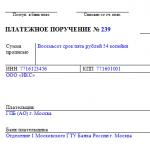
Get a debt on a writ of execution. Debt collection under a writ of execution: the complexity of the procedure. Opportunities of the Federal Bailiff Service
Collecting debts of any nature with the help of a lawsuit is a rather long and costly business. However, starting the fight "for their hard-earned" not everyone imagines that the court can not always put an end to the litigation. Very often, instead of her, the plaintiff receives a "bold comma" and the beginning of a new process - debt collection through the enforcement bodies, the Federal Bailiff Service.
Debt collection procedure
The situation when the defendant agrees with the court decision and is ready to pay the debt voluntarily after the court decision is made can be considered just ideal. In practice, it is rare. Most debtors prefer to pay when there is nowhere to go. Enforcement of judicial decisions in Russia is carried out on the basis of the Federal Law "On Enforcement Proceedings".
In general, the debt collection procedure is as follows. The court makes a decision and draws up a writ of execution, which serves as a basis for bailiffs to enforce debt collection.
In accordance with article 64 of the above law, the bailiff has the right to apply a wide range of measures. In short, this is the seizure of the debtor's property and funds, checking financial documents, tracing the debtor and his property.
Immediately after the entry into force of the court's decision, the court must issue a writ of execution to the claimant, or send it to enforcement proceedings at the request of the claimant. Thus, from the very beginning, the execution of the judgment depends on the plaintiff, on his will and desire to collect money.
If the claimant did not receive a writ of execution or did not write an application for sending it to enforcement proceedings, then the court decision "hangs" and the plaintiff will not receive money.
When deciding whether to get a writ of execution in your hands, or send it to the bailiff service through the court by mail, it should be borne in mind that in practice there are cases when only sending the writ of execution to the FSSP authorities takes several months.
The procedure for collecting a debt under a writ of execution through the bailiff service
Having received a writ of execution in his hands, the claimant usually takes it to the FSSP department, in whose jurisdiction the territory where the debtor lives or his property is located. As stated in Part 3 of Article 30 of the Law "On Enforcement Proceedings": "... at the place where enforcement actions are taken and enforcement measures are applied."
Having received a writ of execution, the bailiff initiates enforcement proceedings within three days, but he is obliged to do this only upon a written application from the claimant, in which the latter can state his claims and petitions for property claims and restrictions against the debtor.
If the writ of execution entered the service for the first time, then the bailiff appoints a deadline for voluntary fulfillment of the requirements contained in the writ of execution, which cannot exceed five days from the date the debtor receives a resolution to initiate enforcement proceedings.
The Law "On Enforcement Proceedings" determines the terms of collection under a writ of execution. In general, in accordance with Part 1 of Art. 36 of the law, the requirements of the document must be fulfilled by the bailiff within two months. However, part 7 of the same article establishes that this period does not include periods when proceedings are suspended or postponed.
In practice, the proceedings to collect a debt through a writ of execution can take a very long time. To speed up actions in the application to the bailiff service, you should specify as much information about the debtor as possible. In addition, it is recommended to periodically remind the bailiff about yourself, to be interested in what specific actions are being taken to collect debts and search for property, insist in writing on repeated requests to banks and other organizations.
Independent collection of debts under a writ of execution
The law provides for the possibility of independent actions to collect debts under a writ of execution. If there is information about the debtor's bank account, the recoverer may apply to the bank with a requirement to write off the amount of debt from his account. The application should indicate the details of the account to which the money should be transferred, information about the identity document of the claimant, details of the writ of execution. The writ of execution itself is attached to the application.
If the amount of the debt to be collected under the writ of execution exceeds 25 thousand rubles, then the writ of execution may be submitted at the place of work of the debtor or at the place where he received other income.
What do you think about the article “After the trial. How to get money under a writ of execution? " Please comment on it!
A large number of loan products give us the opportunity to acquire new things without wasting time accumulating. This is, of course, good. But there are problems in the form of bad loans.
Lenders are trying their best to recover the funds issued, using various means, from contacting collection agencies to litigation in court. As practice shows, it is the last method that is the most effective. Indeed, with the help of deducted from the debtor's salary, his accounts and property are seized. The question remains - how to collect a debt under a writ of execution, if the debtor has nothing: no property, no money.
Employees of the collection service apply a whole range of measures used to forcibly repay debts if a citizen does not want to voluntarily return the funds taken.
Before recognizing the fact that a citizen has nothing, the service employee must take the following measures:
- By requesting the tax office, he tries to find out the debtor's place of work. True, he can achieve success only if the citizen works officially.
- A similar request to the pension office - maybe the debtor receives a pension, and to the traffic police - whether he has a registered vehicle.
- Contacting the registration office for property ownership and the bank for deposits and accounts.
The described actions did not lead to positive results, then the following measures can be applied by the service employees:
- Debtor is prohibited from traveling abroad.
- Debtor's agreements on voluntary repayment of the debt formed.
- Checking the family status of the debtor borrower. With a positive answer from the registry office, it is possible to withhold part of the property from the spouse under the terms of joint liability.
In cases where the above measures were not successful, the service employee has the right to declare the debtor's property on the executive search. For this, he makes an appropriate resolution.

The basis for its issuance may be a claim by the claimant - in this case, the decision must be issued within three days after receipt. Also, such a decree may see the light if the employee has a reason for declaring a wanted list.
The debtor needs to know that, according to the law, the bailiff has every right to take actions of any nature that do not contradict the law and contribute to the fulfillment of his duties to recover debts. The list of actions is determined by the employee himself, taking into account the specifics of the case.
For example, he has the right to use the media, posting free of charge in them notices about the search for both the debtor himself and his property with a request to help in the search. There are such examples, and the practice of using them shows that many citizens are happy to respond to the request of employees.
He can also resort to the help of employees of private detectives who work officially.
If there is no money and property and the debtor does not work anywhere, there is also a way out. Of course, the bailiff cannot force the debtor to get a job, but it is in his right to give him a referral to the employment service. Usually, employees do this, especially when the debts are formed on alimony.
What happens when the debtor has nothing found
In this case, the writ of execution is simply returned back to the claimant. At the same time, an act is drawn up, which indicates that the search measures did not give anything. Also, the service employee issues a resolution to terminate the proceedings and return the writ of execution to the claimant. The latter can re-submit it for execution in two months. If new information appears about the debtor and his property, then the return can be made earlier.
What can the debtor face in this case?
If the production has not brought success, and the debtor still does not want to pay voluntarily, then what should the claimant be? Only one thing is to apply to law enforcement agencies to bring him to justice in accordance with Art. 315 CC.
In addition, the interaction of the claimant with the bailiffs and traffic police officers will deprive the debtor of the driver's license for a certain time.
In addition, the debtor can use the new bankruptcy law for individuals. faces. The disadvantage is the high cost and complexity of the aforementioned article, people simply do not want to refer to it because of the aforementioned details.
What else?
Despite all the efforts of the collecting party, the legislation says unequivocally - there are no effective measures to collect overdue debts. Example: the judge makes his decision, and while it comes into force, the debtor has time to get rid of his property. He can rewrite it to a relative, issue a deed of gift, including for an existing business. Many workers officially quit and start working unofficially.
The ban on travel abroad does not scare them either, because inside the country there is an opportunity to have a good rest. And it is very difficult to prove that they did all this on purpose. As you can see, the debtor's "arsenal" has quite a few different ways to avoid payments.
Whereas the opposing party is limited by the requirements of the law, so in most cases they simply hope that the debtor will eventually wake up his conscience and begin to pay.
The claimant, for his part, may also apply to:
- Service of mediators - a company that helps in negotiations with the debtor to reach a compromise.
- Collectors - they often work much more efficiently. But here the danger is different - these offices use methods whose legality is on the brink.
- To maximize interaction with bailiffs. For example, try to independently collect additional information about the debtor and transfer it to the service staff.
As you can see, there are not many ways, but they are available.
So, what you have been waiting for has happened. Finally, you have received a writ of execution to recover a very decent amount of money from the debtor and are looking forward to the return of your "hard-earned" money. It is good if your debtor has money, and even better if he has a desire to return it to you. But it's no secret that cases of quick and easy repayment of overdue debt are quite rare. Most likely, by the time you received the executive document, you had already tried a lot: you negotiated with the debtor to pay off the debt, sent him claims with a detailed description of the legal consequences of evading debt payment, filed a lawsuit, won the process and received a decision. At the same time, a significant period of time has passed: on average, typical accounts receivable cases last from six months to a year. As practice shows, in most cases, winning the court is only half the way that the claimant has to go through. The second half, if your debtor is not financially sound, falls on the enforcement of the court decision.
Where is the writ of execution submitted?
There are several options for how you can present a writ of execution for collection. According to the Federal Law "On Enforcement Proceedings", you have the right to submit an enforcement document to the territorial office of the Bailiff Service. This can be a branch located both at the place of residence (registration) of the debtor, and at the place of his stay (actual location), as well as at the location of his property.
In addition, you can also bypass the appeal to bailiffs and submit a writ of execution to the bank in which the debtor's current account is opened. To find out which bank the debtor uses, contact any tax authority with an application to provide information about the debtor's accounts - and you will be able to receive this information after 7 days. And if your debtor is a citizen from the public sector, then you can start with Sberbank: given the share of the banking market that it occupies, the chances of writing off the debtor's money "at random" are quite high. A bank that has received a writ of execution from a claimant is obliged to independently establish accounts and write off funds from all existing accounts within the amount specified in the writ of execution.
Finally, a writ of execution can be presented to an organization that pays periodic payments to the debtor-citizen (salary, pension, scholarship). This may be the debtor's employer company, a pension fund, an educational institution, etc. Legislation allows this method of collection if the amount of the debt does not exceed 25,000 rubles or if health damage is reimbursed according to the executive document, alimony or other periodic payments are collected.
How to properly fill out an application to the bailiff service?
If it is impossible to collect a debt with the help of banks, an employer and other organizations, then you should contact the Bailiffs Service.
Enforcement proceedings are initiated by the bailiff-executor on the basis of an application by the claimant or his representative. The original of the writ of execution and the power of attorney of the representative (if he signs the application himself) are attached to the application for initiation of enforcement proceedings.
Before submitting a writ of execution, it is important to check whether the three-year term for the presentation of a writ of execution has expired, whether all the necessary information is indicated in the executive documents (see the list of requirements in Article 13 of the Federal Law "On enforcement proceedings") and whether there are errors in the executive document. Otherwise, the bailiff is obliged to refuse to initiate enforcement proceedings. True, it is worth noting that, for example, in recent years, judicial practice is critical of refusals to initiate enforcement proceedings due to the lack of information on the place of birth of the debtor in the writ of execution, pointing out the insignificance of this identifying information (see Resolution of the Arbitration Court of the Ural District from October 7, 2015 in case No. А60-19042 / 2015).
Particular attention should be paid to the power of attorney, that is, the powers of the representative. The text of the power of attorney must indicate the right of the authorized person to present and revoke the executive document. Otherwise, the bailiff will issue a decree on refusal to initiate enforcement proceedings and return the writ of execution. It is also worth knowing about other powers of the representative, which are specially stipulated in the power of attorney. These powers are:
- transfer of authority to another person (transfer of trust),
- appeal against decisions and actions (inaction) of a bailiff,
- receipt of the awarded property,
- waiver of collection under a court order,
- conclusion of an amicable agreement.
Thus, when preparing a power of attorney, it is necessary to check whether the scope of the powers specified in the power of attorney corresponds to those powers that are really necessary when representing the interests of the claimant.
It is important to work carefully on the content of the statement. The application must include applications for the seizure of property that you know about:
- information about bank accounts,
- real estate (you can make inquiries in advance and attach an extract from the USRN to the application),
- motor vehicles (you may have taken a copy of the vehicle registration certificate),
- information about the place of work (specify the employer's details, address, telephone number),
- information from the Unified State Register of Legal Entities on the rights to the debtor's shares in organizations,
- information about the spouse of the citizen-debtor (the spouse's property can be arrested, and the creditor can demand the allocation of the debtor's share through the court).
Sometimes, due to a lack of information in the statement, the bailiff conducts enforcement proceedings for several months, while this could have been done much faster.
We recommend that when submitting documents to the office of the bailiffs department, immediately inquire which of the bailiffs-executors will receive the executive document, find out the number of his office and contact phone number. The claimant's statement and the writ of execution are transferred from the office to the bailiff within 3 days. It is important to monitor compliance with this deadline (you can call or come back). In enforcement proceedings, non-working days and holidays are not taken into account when determining the term. In practice, there are cases when, without any legal basis, an executive document can lie in the office for more than a year.
The bailiff-executor, within three days from the date of receipt of the executive document to him, makes a resolution to initiate enforcement proceedings or to refuse to initiate enforcement proceedings. This process also cannot be ignored: if necessary, you need to remind the bailiff of the deadline set by law.
It is noteworthy that the claimant now has the opportunity to receive information on the progress of enforcement proceedings using e-mail. To do this, you must provide your email address in the application for the initiation of enforcement proceedings or in a separate notification. In addition, it became possible to send electronic applications through the personal account of the party to the enforcement proceedings to. Electronic interaction in this field is still being improved, but it is already yielding modest results, allowing you to quickly receive and transmit information, applications and petitions.
Information on the initiation of enforcement proceedings and the data of the bailiff who conducts the proceedings can also be obtained from the Data Bank of enforcement proceedings on the website of the Bailiff Service. In addition, you can subscribe to changes in information on the enforcement proceedings of your debtor, which is very useful.
In addition, we recommend that you subscribe to change information about the debtor on the site. In the event that a bankruptcy case is initiated against the debtor, you will have two months (from the date of publication) to include your claims in the register of creditors' claims for their subsequent satisfaction from the debtor's bankruptcy estate. Upon completion of the procedure, the bankrupt organization will be excluded from the register of legal entities, and the bankrupt citizen may be released from paying debts.
Enforcement proceedings have been initiated, what's next?
After the initiation of enforcement proceedings, the bailiff sends electronic inquiries to the Rosreestr, the Federal Tax Service, the State Traffic Safety Inspectorate, the Pension Fund of the Russian Federation, to banks with which electronic document management is organized, the registry office, the State Inspectorate for Information Technologies, Rostekhnadzor, mobile operators, and the Federal Migration Service. Answers to inquiries, as already noted, come to the bailiff within a few days, and some - within a few weeks.
If there is an urgent need to arrest the debtor's property, then you need to agree with the bailiff-executor on a joint departure, if possible, providing vehicles. It is best to go to the debtor in the very first days of enforcement proceedings, that is, while he is not yet aware of the initiation of the enforcement procedure. In this case, the debtor may not have time to transport liquid property to another location or "draw" documents confirming the disposal of property from his property.
During the check-out, insist (or better - agree with the bailiff in advance) on drawing up an act-inventory of property, issuing an order on the seizure of property and transferring the seized property for safekeeping to you (except for real estate, which cannot be transferred to the claimant for storage). If the property, when it is seized, is transferred for safekeeping to the debtor or his family members, then the debtor must be warned in writing about criminal liability under Art. 312 of the Criminal Code of the Russian Federation "Illegal actions in relation to property subject to inventory or seizure or subject to confiscation."
If the amount of the debt is more than 2,250,000 rubles, remind the bailiff of the need to warn the debtor about criminal liability under Art. 177 of the Criminal Code of the Russian Federation "Malicious evasion from repayment of accounts payable." In the future, this may provide additional opportunities to induce the debtor to pay off the debt.
If the debtor interferes with the bailiff or refuses to fulfill his legal requirements, then he may be brought to administrative responsibility under Art. 17.14 of the Administrative Code of the Russian Federation. By the way, any persons and organizations that do not comply with the requirements of the bailiff to provide information, transfer money, etc. can be fined under this article.
How to restrict the debtor from traveling abroad?
The bailiff has the right to restrict the debtor's travel outside the Russian Federation for six months if:
- the debtor has been notified of the initiation of enforcement proceedings,
- the basis for collection is a judicial act,
- the 5-day period has expired for the voluntary execution of the judicial act,
- the debt exceeds 30,000 rubles (and for socially important penalties - alimony, compensation for moral damage, etc. - 10,000 rubles).
If the amount of the recovery is from 10,000 to 30,000 rubles, then such a measure may be applied after two months, provided for the voluntary execution of the judicial act.
If, six months after the issuance of the judicial act, the debtor has not yet paid off the debt, the bailiff may re-impose a ban on leaving Russia. It is important for the recoverer to track the completion of the specified deadlines and remind the bailiff of the need to re-issue the order to restrict the debtor from traveling abroad.
How do bailiffs sell the debtor's property?
First of all, foreclosure is made on the debtor's funds. Until all his bank accounts are checked, the seized property will not be issued for sale. Therefore, it is important to find out whether the debtor's existing accounts have been checked, whether there are banks' answers in the case. If there is no money in the debtor's bank accounts or there is not enough money, the bailiff begins the assessment and sale of the seized property.
The appraisal and sale of the debtor's property is carried out by specialized organizations. At an open auction in the form of an auction, the following are sold:
- things more expensive than 500,000 rubles,
- the property,
- securities,
- property rights,
- the pledged property, which has been foreclosed to meet the claims of a claimant who is not a pledgee,
- items of historical or artistic value.
The Federal Property Management Agency is in charge of organizing and conducting tenders. Information on the sale of property at auction is published in periodicals and on.
If the property is not sold after the first auction, the bailiff reduces its value by 15% and puts it up for auction again. If the re-bidding did not take place, the bailiff proposes to the collector to take the unrealized property with a decrease in value by 25% of the initial price in order to repay the debt. If the claimant does not collect the unrealized property within five days after receiving the offer, then it is returned to the debtor. According to the law, the sale of property is carried out within two months, but in practice this procedure takes three months to two years (this depends on the quickness of the bailiff, appraiser, distributor, as well as on the involvement of the claimant in the implementation process).
It is impossible not to mention the simplified procedure for the sale of property worth less than 30,000 rubles. In the event of a seizure of such property, the debtor has the right, within ten days from the date of notification of the assessment, to file a petition for its independent implementation. The bailiff can provide the debtor with the opportunity to sell the property within ten days. The claimant, after receiving the assessment of the property, also has ten days to submit a petition to retain the property. In the absence of a petition for self-sale by the debtor or unsuccessful sale of the property by the debtor, the bailiff offers the property to the recoverer to repay the debt. If the claimant refuses to accept it, the property is transferred for compulsory sale in the usual manner.
Thus, the first debtor is given the right to sell property worth less than 30,000 rubles. Then the right to take the property against the debt is given to the claimant. If there are several claimants who have filed a petition, then the first will be the one whose requirements are higher in the order established by Art. 111 of the Federal Law “On Enforcement Proceedings, and if the claimants belong to one queue - the one whose list was submitted for enforcement earlier than the other.
It is important to take into account that the debtor-citizen has enforcement immunity established by Art. 446 Code of Civil Procedure of the Russian Federation. Residential real estate, which is the only one suitable for the living of the debtor and his family, is not subject to sale.
Disputes regarding the granting of immunity to multi-floor houses and apartments of the debtor still do not subside. The Constitutional Court of the Russian Federation recommended the legislator to develop the necessary legislative framework to overcome immunity for living space that exceeds the social norms of housing, and several draft laws have appeared that have failed. Nevertheless, the issue is being discussed, and someday it will be finished.
There are two important aspects to note. Firstly, immunity presupposes the prohibition of sale, while the seizure of property is not prohibited. Therefore, when opening an inheritance within the value of the inherited property, the heirs will be responsible for the debts of the testator, and if the property is escheat, it will be inherited by the state represented by the Federal Property Management Agency or the municipality (if land or residential real estate is inherited). It is important that the seizure imposed on the debtor's residential property is preserved and the enforcement proceedings are not mistakenly ended or terminated.
Secondly, while the legislator is thinking about how to properly foreclose on a part of the debtor's multi-meter residential premises, a judicial practice has appeared, which makes it possible to allocate part of the property (one or several rooms) and sell it at auction. It's pretty bold, progressive, but not too common.
In compulsory execution, an important issue is whether the debtor has common property acquired in marriage. Sometimes all the property is registered with the spouse, and here the bailiff-executor has a rarely used opportunity to request information about such property and to impose arrests on it until the issue of separating the debtor's share from the common property of the spouses is resolved.
Should I appeal against the actions of the bailiff?
According to the law, the requirements contained in the enforcement document must be executed by the bailiff within two months from the date of initiation of enforcement proceedings. This does not mean that the debt will be collected in two months. It also does not mean that the bailiff-executor will issue an order to terminate the enforcement proceedings.
The expiration of the terms for the execution of enforcement actions and the application of enforcement measures does not entail consequences in the form of the end of enforcement proceedings. The executive document can lie with the bailiff for years. Therefore, an appeal against the inaction of the bailiff in connection with a delay of two months may turn out to be futile. A higher official (senior bailiff of the department) or the court will refuse to satisfy such a statement.
In practice, appealing against the bailiff's actions leads to excessive formalism in his work on your production. Therefore, it is better to have a trusting relationship with the bailiff.
We recommend that you complain to the senior bailiff, the prosecutor's office or the court only when it comes to a material violation of your rights (for example, if the bailiff commits illegal actions or if there is information and facts that the bailiff is in collusion with the debtor). We recommend that you notify the bailiff of your intention to file a complaint: perhaps the bailiff will correct the mistakes made or stop inaction, and you will not have to complain.
The article was written specifically for the site
bankruptcy, execution of decisions, collection services
Receiving a court decision on debt collection does not mean that the money from the debtor will immediately go to your account. After the issuance of a writ of execution, the vast majority of creditors begin a long and ineffective procedure for enforcement proceedings, entrusting their money to a bailiff who has no motivation to repay the debt.
Statistics states:acting in this way, you will not achieve the result. This is practically tantamount to "throwing out" the writ of execution.
If the bailiffs are idle
The inaction of bailiffs is a very common phenomenon. From year to year the problem of non-enforcement of court decisions withit is becoming more and more acute (the level of debt collection by bailiffs in 2017 was 3%). In most cases, they return the writ of execution due to the "impossibility of recovery" and leave the creditor alone with their problems. At the same time, the inaction of the bailiffs often leads to the loss of property, due to which it would be possible to pay off debts. Even writing complaints does not lead to the desired result. In this situation, it is better to entrust the writ of execution to a collection agency than to hope for the bailiffs to collect the debt on their own.
Debt collection under a writ of execution
Orion Group pays special attention to the stage of execution of the court decision. As a rule, we do not work with the bailiff service, but find alternative and more efficient methods of collecting funds under a writ of execution. In some cases, we work through the bailiff service through our own channels, but we provide active assistance, which allows us to make this procedure fast and effective.
Debt collection under a writ of execution - what exactly do we do
1) We collect information about the current financial and economic activities of the debtor or his management: current settlement accounts, property and other assets, closest connections, etc.
2) We carry out special visits to the debtor at their actual location or meet with them in one of our offices, conduct telephone conversations
3) We present a writ of execution for collection to the debtor's bank, arrest the debtor's funds and property, find and return the withdrawn assets
4) If necessary, we initiate the debtor's bankruptcy procedure or procedurecriminal prosecution for debts in the presence of appropriate signs (fraud, evasion of the execution of a court decision, etc.)
5) If necessary, we provide assistance to the bailiff service for conducting joint raids to the debtor (photo from the joint raid above), or we organize a forced drive of the debtor.
Timing and efficiency of collection under a writ of execution
In the presence of a writ of execution, collection, as a rule, lasts no more than three months. Our goal at this stage is to fully repay the debt in accordance with the court decision. According to our statistics, at this stage we collect up to40% from all debts transferred to us for work.
Procedure for the execution of a court decision through a collection agency
| Contacting us by phone or via application from the site | We analyze the prospects of collection for free |
We offer working conditions and disclose the collection mechanism |
After signing the contract, we immediately start working |
Debt repayment,% payment upon collection |
The cost of debt collection services under a writ of execution
We work for the result - our main remuneration is a percentage of the amount actually returned. After fillingdebt collection applications we analyze the prospects of the case free of charge, after which we offer the client specific terms of cooperation.
Debt collection at the expense of the debtor: the Customer's expenses are collected from the debtor in addition to fines and penalties.
Payment to the collection agency may consist of an advance for the costs of the case and the main remuneration in the form of% of the amount actually collected. The specific conditions of cooperation, the size of the main remuneration and prepayment depend on the circumstances of the case and are determined based on the analysis of the debtor. Find out the approximate terms of cooperationONLINE.
Please note, Orion works with debts only from800 000 rub.
We know what to do with your debtor - collection technologies have been worked out for years. Don't wait for the debt to become bad, fill out the required form or call us now.






-2ub-190x190.jpg)










